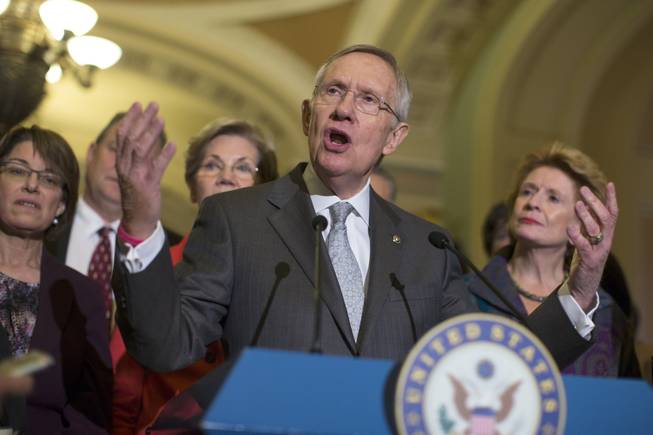
Evan Vucci / AP
Majority Leader Harry Reid speaks during a news conference on Capitol Hill in Washington on Thursday, Nov. 13, 2014, after Senate Democrats voted on leadership positions for the 114th Congress.
Tuesday, Nov. 25, 2014 | 2 a.m.
With Chuck Hagel's resignation, America now needs a new secretary of defense, along with a new attorney general and dozens of federal judges and ambassadors.
Approving President Barack Obama's choices for those jobs will fall to Republicans, who take over the Senate in January.
But Senate Republican leaders face a dilemma on how to confirm Obama's nominations: Do they keep a rules change that makes it easier to approve who they want, or should they return to decades of precedent that lets the other party have more say?
It would seem an easy choice — if it weren't for the story behind the rules change. It was engineered by the Republicans' nemesis, Sen. Harry Reid, almost exactly one year ago.
The Nevada Democrat and Senate majority leader used a rare parliamentary procedure to allow only Supreme Court nominees to be subject to a 60-vote threshold. The Senate can now approve all other presidential nominees by a simple 51-vote majority. The change became known as the nuclear option because it was so extreme.
The nuclear option allowed frustrated Democrats to avoid frequent Republican filibusters on nominations.
Back then, Republicans decried the move as tyrannical overreach.
"It's a sad day in the history of the Senate," said then-Senate Minority Leader Mitch McConnell, R-Ky.
Now, the tables are turned. Senate Republicans, who will have at least 53 members in January, could face filibusters by Democrats if the rules switch back and if after 2016 there is a Republican president and Republican Senate. So the new Senate majority may decide to embrace the very tactic it vilified when Reid employed it.
The party appears split on what to do.
About 26 conservative leaders sent a letter to Republican senators encouraging them to keep Reid's rule change.
"We've seen very little upside and significant downside in reviving the judicial filibuster," the letter read.
"That remains a subject of discussion," said Sen. John Cornyn, of Texas.
Reid will have served as Senate majority leader for seven years when he hands the title over in January. He will forever be remembered as the leader who pressed the button on the nuclear option. With big nominations like Defense Secretary on their to-do list, will Republicans change it back? The answer could add to Reid's legacy in the Senate.

Join the Discussion:
Check this out for a full explanation of our conversion to the LiveFyre commenting system and instructions on how to sign up for an account.
Full comments policy